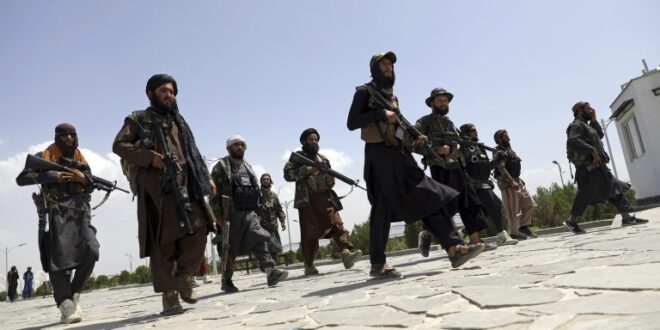China’s establishment of military bases in Tajikistan reflects a shared concern with Central Asian countries about the Taliban’s return to power in Afghanistan.
Tajikistan is pivotal to China and other actors because it borders areas of Afghanistan where there is a small, but active, armed opposition to the Taliban.
Regional and global powers no longer trust the Taliban’s pledges to prevent global jihadist groups from operating in Afghanistan.
China, as well as Russia, wants to prevent the United States from establishing a significant military presence in Central Asia.
On October 27, the lower house of Tajikistan’s parliament approved China’s proposal to fund construction of a $10 million military base in an area near the intersection of the Afghan, Chinese, and Tajik borders. In addition, as part of an apparent agreement reached during a high-level visit of Chinese officials in July, Tajikistan’s government approved the transfer to China of full control of another base. This base is located in the Murghab region of Tajikistan that is near the narrow border that China shares with Afghanistan. The transfer reportedly is linked to China’s pledge to fund the deployment of additional Tajik military personnel to areas along the Afghan border. Although both sides have avoided clarifying how many Chinese military personnel are operating in the region, the new Tajikistan-China base agreements appear to position China’s military to act, if necessary, against the Taliban regime or any transnational jihadist groups that the Taliban might harbor. China also has concerns that Islamist extremists among its Uighur minority might find safe haven in Afghanistan and use it as a basis to stage armed attacks, although many in the international community have consistently asserted that China has exaggerated the terrorism threat to justify oppressing its Uighur population.
Tajikistan borders the one area of Afghanistan where there is a still small but active armed opposition that controls at least a few pockets of territory in Panjshir province and its surrounding areas. This anti-Taliban opposition is dominated by ethnic Tajiks who have long enjoyed support from Tajikistan, Iran, and India. China might potentially use its bases in Tajikistan to add its support to that opposition as a lever against the Taliban. The potential for outside actors to support Taliban opponents will increase if the opposition builds momentum on the battlefield. However, in contrast to 1996 – 2001, the Taliban now control the Afghanistan-Tajikistan border, and supplying the opposition would necessitate direct confrontation with their forces. In addition, many states do not want to be blamed for worsening the dire humanitarian situation for Afghans by promoting continued warfare, particularly after the debacle that was the withdrawal of many Western states and the ongoing sense of betrayal and devastation for many Afghans who served those governments.
The collaboration between Tajikistan and China reflects a broader marriage of interests between Central Asia and global powers to contain any jihadist threat emanating from Taliban-ruled Afghanistan. Recognizing that the Central Asian countries share many concerns about the Taliban, the United States has sought to negotiate basing rights in Central Asia to gather information and act quickly against terrorist threats emanating from Afghanistan. Colin Kahl, the U.S. Undersecretary of Defense for Policy, said at a late October Senate hearing that the United States has had “extensive conversations” and expects to have more, with Uzbekistan, Tajikistan and others about accessing Central Asian bases. According to Kahl, U.S. forces “need to build out more capability so we’re not just reliant on facilities we have in the Arabian Gulf.” The closest major U.S. facilities, including the large Al Udeid air base in Qatar and Al Dhafra in the UAE, are more than 1,500 miles away, considering the fact that Iran does not permit U.S. military aircraft to overfly its airspace. Kahl added in his testimony: “We have not secured firm basing agreements” with any of Afghanistan’s direct neighbors. In the wake of the Afghanistan withdrawal, the Biden administration perceives the need to access areas close to Afghanistan in order to prevent the Islamic State-Khorasan (IS-K), the Afghanistan faction of the Islamic State, from building the capacity to conduct international operations.
Yet, U.S. efforts to augment its capabilities against Afghanistan-based terrorist groups runs up against the strategic interests of not only China but also Russia. Both powers, although they share the U.S. threat assessment, do not want U.S. forces near their territories. Russia, in particular, is in a position to influence the Central Asian countries—all members of the former Soviet Union—to deny U.S. requests for basing access. In mid-October, when asked about Washington’s intentions of deploying anti-terrorism forces on the territory of Uzbekistan, Russia’s Foreign Minister Sergei Lavrov said: “All our Central Asian neighbors, allies and strategic partners confirm in talks with us that they find such approaches to be inadmissible… I did not hear about this issue and perhaps this question should be addressed to our colleagues in Uzbekistan… I should reiterate that all our friends in Central Asia are telling us that they are against such approaches either from the United States or from any other NATO member state.” The Russian position on U.S. bases in Central Asia, coupled with China’s expansion of its military presence in the region, suggests that the three largest world powers are likely to pursue their own counterterrorism strategies independently—rather than through coordination, information-sharing, and cooperation.
 Eurasia Press & News
Eurasia Press & News



